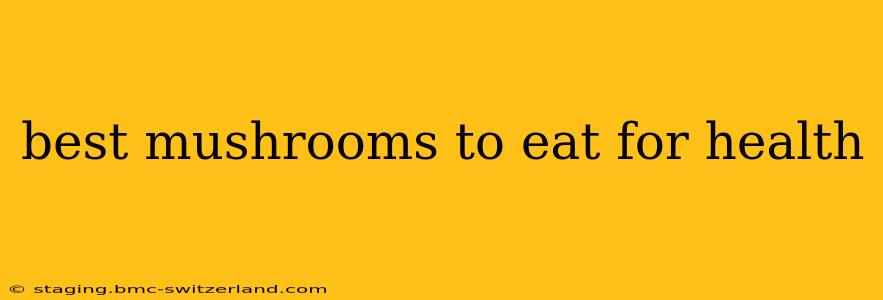Mushrooms, far from being mere culinary additions, are nutritional powerhouses packed with vitamins, minerals, and unique bioactive compounds that offer a wide array of health benefits. While many mushroom varieties are edible, some stand out for their exceptional nutritional profile and medicinal properties. This guide explores some of the best mushrooms to eat for optimal health, highlighting their specific benefits and how to incorporate them into your diet.
What Makes a Mushroom Healthy?
Before diving into specific varieties, let's understand what makes certain mushrooms particularly beneficial for health. Many boast high levels of:
- Antioxidants: These combat free radicals, protecting cells from damage and reducing the risk of chronic diseases.
- Beta-glucans: These soluble fibers support immune function and may have anti-cancer properties.
- Vitamins and Minerals: Mushrooms are a good source of various vitamins (like B vitamins and vitamin D) and minerals (like selenium, potassium, and copper).
- Unique Bioactive Compounds: Certain mushrooms contain specific compounds with potent medicinal effects, such as polysaccharides and triterpenes.
Top Mushrooms for Health & Their Benefits
Here are some of the champion mushrooms for their health-boosting properties:
1. Shiitake Mushrooms
Shiitake mushrooms are renowned for their rich umami flavor and impressive health benefits. They're a great source of B vitamins, copper, and selenium, and contain lentinan, a polysaccharide with potential anti-cancer and immune-boosting effects. Regular consumption may contribute to improved cardiovascular health and reduced inflammation.
2. Maitake Mushrooms (Grifola frondosa)
Often called the "hen of the woods" mushroom, Maitake is celebrated for its potent immune-boosting properties. It contains various polysaccharides, including beta-glucans, which stimulate the immune system and may help fight infections. Some studies suggest Maitake may also help regulate blood sugar levels.
3. Reishi Mushrooms (Ganoderma lucidum)
Reishi mushrooms are prized in traditional Chinese medicine for their adaptogenic properties – meaning they help the body adapt to stress. They are rich in triterpenes, which may have anti-inflammatory, antiviral, and anti-tumor effects. While not particularly flavorful, Reishi is often consumed in supplement form (tea, extracts) due to its potent medicinal benefits.
4. Lion's Mane Mushrooms (Hericium erinaceus)
This unique mushroom, with its cascading mane-like appearance, is gaining popularity for its potential cognitive benefits. It contains unique compounds that may stimulate nerve growth factor (NGF) production, potentially supporting brain health and cognitive function. Some studies suggest it may help improve memory and concentration.
5. Oyster Mushrooms (Pleurotus ostreatus)
Oyster mushrooms are widely cultivated and readily available. They are a good source of protein, fiber, and various vitamins and minerals. They also contain compounds with potential cholesterol-lowering and anti-cancer properties. Their mild flavor makes them versatile in cooking.
How to Incorporate Mushrooms into Your Diet
The beauty of these medicinal mushrooms is their versatility. You can incorporate them into your diet in various ways:
- Sautéing: Many mushrooms sauté beautifully, adding depth of flavor to stir-fries, pasta dishes, and omelets.
- Soups and Stews: Mushrooms add hearty texture and umami flavor to soups and stews.
- Tea: Reishi mushrooms are commonly consumed as a tea.
- Supplements: Extracts and powders of certain mushrooms are available as supplements. Always consult with a healthcare professional before taking mushroom supplements, especially if you have underlying health conditions or are taking medications.
Are There Any Side Effects to Eating Mushrooms?
While generally safe, some individuals may experience mild digestive upset (like gas or bloating) after consuming mushrooms, especially in large quantities. It's crucial to only consume mushrooms that have been correctly identified as edible, as some wild mushrooms are highly toxic. If you are unsure about the edibility of a mushroom, do not consume it.
Frequently Asked Questions (FAQs)
What are the best mushrooms for immune support?
Maitake, Shiitake, and Reishi mushrooms are particularly well-regarded for their immune-boosting properties due to their high beta-glucan content and other bioactive compounds.
Which mushrooms are good for brain health?
Lion's Mane mushrooms are gaining significant attention for their potential to support brain health and cognitive function by stimulating nerve growth factor production.
Can I grow my own medicinal mushrooms?
Yes, many medicinal mushrooms can be cultivated at home, either using grow kits or by creating your own substrate. Research the specific requirements for the mushroom species you choose.
Where can I buy medicinal mushrooms?
Medicinal mushrooms are widely available at health food stores, farmers' markets, and online retailers. When buying supplements, choose reputable brands that provide third-party testing to ensure purity and quality.
Are all mushrooms good for you?
No, many wild mushrooms are toxic and should never be consumed unless you are an expert in mushroom identification. Always prioritize safety and only consume mushrooms from reputable sources or those you have positively identified as edible.
This article provides general information and should not be considered medical advice. Always consult with a healthcare professional before making any significant changes to your diet, especially if you have underlying health conditions or are taking medications. Enjoy exploring the fascinating world of functional fungi and incorporating these amazing mushrooms into your healthy lifestyle!
